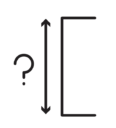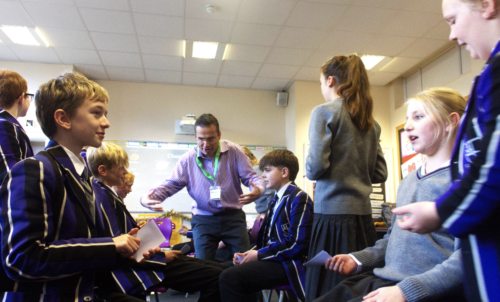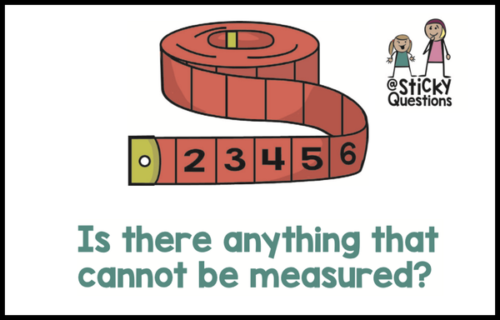In this final bulletin of 2024, a chance to reflect with your students on 2024 with the philosophical theme of numbers and measurements. It’s inspired by getting someone else’s bulletin which was a kind of mini-impact report of what they’d achieved that year. We’ll briefly do a similar thing below to provide a worked example (and it’s quite satisfying to calculate!). Across our businesses in 2024, we have…
Sent over 590,000 resources emails to teachers in 93 countries, for free
Over 296,680 Sticky Questions sent home
Directly worked with over 9,000 students
Delivered 6950 hours of online classes
Published over 3000 debate motions
Asked over 500 philosophical questions
Worked with over 100 schools
Facilitated 709 students walking over 36,000 km on our Duke of Edinburgh expeditions
Lit 21 campfires
Served more than 1000 marshmallows in 28 gallons of hot chocolate
Spoke at 6 conferences
Ran 3 residential weekenders
Launched 2 new websites (here and here).
Published 2 books
Ran 1 Summer School
Your Year in Numbers?
You could see this as an educational equivalent of Spotify Wrapped, just one where you and your students do the maths (which is actually the fun bit). It also involves the Thinking Move of “Sizing“. Here’s what we say about it in the book, Thinking Moves A-Z:

‘Getting the measure of something’, or ‘sizing up the task’ is an essential skill. Estimating how much equipment you will need, or how long a particular task might take, is a routine part of most practical projects. Reckoning how much the average person might eat, and how much it might cost, informs how much of a party budget goes on food. Computing how long a journey might determine which mode of transport is taken, or whether you stop overnight. And so on.
There is also a clear value to students in deliberately practising this move at school. Estimating how long this week’s homework might take will impact on their efficiency (as well as what social plans can be made!) Reckoning how long to spend on each question in a test can pay dividends.
You could create a couple of examples of your own – how many lessons you’ve taught, or how many questions you’ve asked. Then, why not get your students to work out their answers to the questions below? A good tip is to begin small – for example, how many done in the average week? Then times that by how many weeks in the year, etc…
- How many books have you read this year?
- How many classroom discussions have you taken part in?
- How many times have you put your hand up to answer a question?
- How many questions have you asked the teacher?
- How many words have you read this year (particularly tricky, but doable!)?
Some might feel impossible to work out, but the saving grace is that the higher the number, the more “out” you can and still class the guess as reasonable.

Philosophy of measurements
The above questions invite estimations, but the below are more about the process itself…
- How could you measure how much thinking you’ve done?
- What’s the hardest thing in the world to measure?
- How could you measure progress in philosophy?
And one of our favourite Sticky Questions that schools use…

What’s new and coming up in the Philosoverse
Tom spent last week in the North East, spending one of the days at Shield Row School, County Durham, where he’s returning to deliver twilight INSET in January. He also squeezed in a guest-spot at a Headteachers online meeting.
Jason is readying a course called “The Spotter’s Guide to Fascism”, the philosophy option on the January Weekender residential over at www.p4he.org These events, near Ketttering, Northants, are open to anyone aged 11-18. There’s a mix of philosophy, improv, D&D, creative writing, art, game creation etc. to choose from. It’s a superb environment for bright, curious young people who enjoy going off-piste in their learning and thrive on a more informal atmosphere than school allows. And plenty of toast and hot chocolate.
If your own child or one you know at school could do with something extra to challenge them, and a new place to find their tribe, this could be manna to them. Some of our participants are thriving at their school and this is the icing on the cake, some feel isolated at school because others aren’t on their wavelength, and many are home-educated. Participants who haven’t been before can use the code, “FIRSTRESIDENTIALJAN” to get £25 off a residential or day ticket.
On Tuesday 14th January, Jason will be part of the line up at Philosophy in Schools Now!: Empowering Young Minds in Northern Ireland, a conference at Queen’s University Belfast. It’s a free event. If any schools in Northern Ireland (or the Republic of Ireland) are interested in booking a workshop (sadly not free!), He’ll be available on Monday, January 13th—please get in touch.
We wish you a very happy festive break and look forward to working with you in 2025.
Tom and Jason
